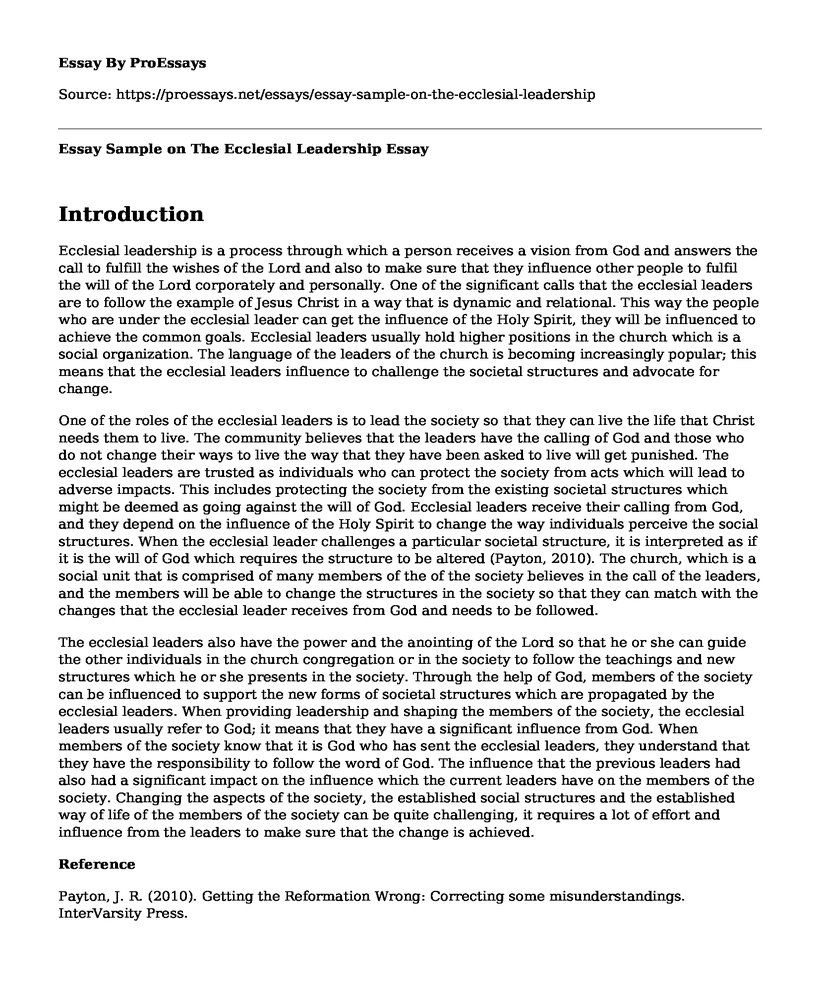Introduction
Ecclesial leadership is a process through which a person receives a vision from God and answers the call to fulfill the wishes of the Lord and also to make sure that they influence other people to fulfil the will of the Lord corporately and personally. One of the significant calls that the ecclesial leaders are to follow the example of Jesus Christ in a way that is dynamic and relational. This way the people who are under the ecclesial leader can get the influence of the Holy Spirit, they will be influenced to achieve the common goals. Ecclesial leaders usually hold higher positions in the church which is a social organization. The language of the leaders of the church is becoming increasingly popular; this means that the ecclesial leaders influence to challenge the societal structures and advocate for change.
One of the roles of the ecclesial leaders is to lead the society so that they can live the life that Christ needs them to live. The community believes that the leaders have the calling of God and those who do not change their ways to live the way that they have been asked to live will get punished. The ecclesial leaders are trusted as individuals who can protect the society from acts which will lead to adverse impacts. This includes protecting the society from the existing societal structures which might be deemed as going against the will of God. Ecclesial leaders receive their calling from God, and they depend on the influence of the Holy Spirit to change the way individuals perceive the social structures. When the ecclesial leader challenges a particular societal structure, it is interpreted as if it is the will of God which requires the structure to be altered (Payton, 2010). The church, which is a social unit that is comprised of many members of the of the society believes in the call of the leaders, and the members will be able to change the structures in the society so that they can match with the changes that the ecclesial leader receives from God and needs to be followed.
The ecclesial leaders also have the power and the anointing of the Lord so that he or she can guide the other individuals in the church congregation or in the society to follow the teachings and new structures which he or she presents in the society. Through the help of God, members of the society can be influenced to support the new forms of societal structures which are propagated by the ecclesial leaders. When providing leadership and shaping the members of the society, the ecclesial leaders usually refer to God; it means that they have a significant influence from God. When members of the society know that it is God who has sent the ecclesial leaders, they understand that they have the responsibility to follow the word of God. The influence that the previous leaders had also had a significant impact on the influence which the current leaders have on the members of the society. Changing the aspects of the society, the established social structures and the established way of life of the members of the society can be quite challenging, it requires a lot of effort and influence from the leaders to make sure that the change is achieved.
Reference
Payton, J. R. (2010). Getting the Reformation Wrong: Correcting some misunderstandings. InterVarsity Press.
Cite this page
Essay Sample on The Ecclesial Leadership. (2022, Dec 01). Retrieved from https://proessays.net/essays/essay-sample-on-the-ecclesial-leadership
If you are the original author of this essay and no longer wish to have it published on the ProEssays website, please click below to request its removal:
- Critical Thinking Essay Example on Business Forecasting
- Report on Johnson & Johnson's Company - The Organization Profile
- Carrefour Hypermarket Iraq Branch Essay
- Four Factors of Production in the Ecosystem - Paper Example
- Essay Example on Evaluating Costing and Value Chain for Optimal Org Growth
- 17 Project Management Approaches: Waterfall, Agile, Scrum, PRINCE2, Kanban - Essay Sample
- Strategizing Leadership for Market Success: A Case Study







